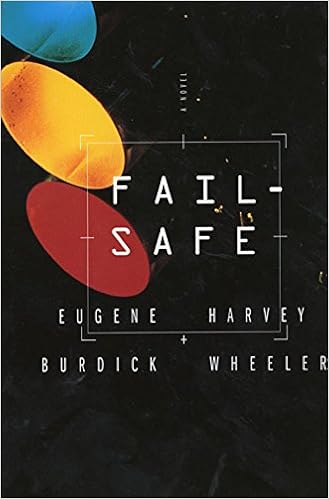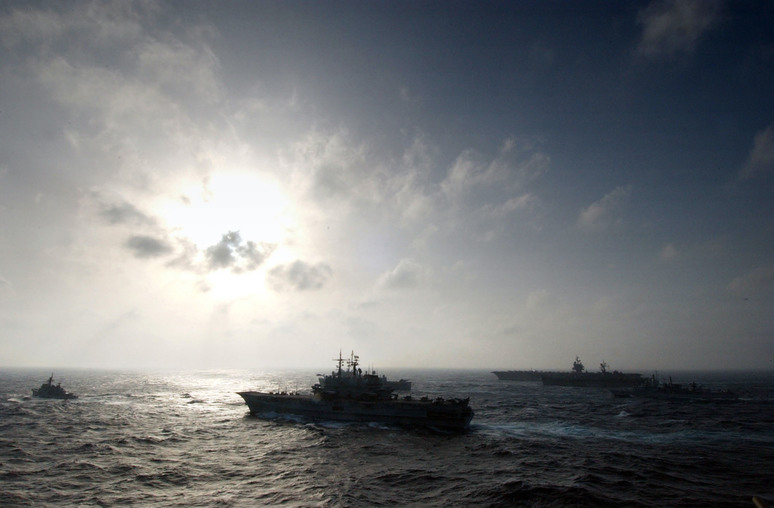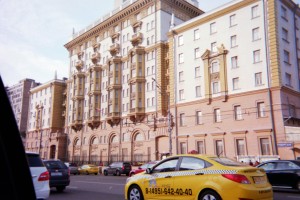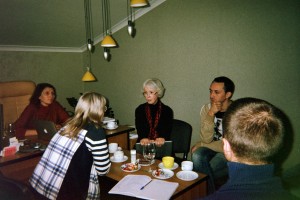
I don’t know what the President is doing, but whatever it is he’d better be right. Khrushchev isn’t going to sit around forever and watch those planes move in on Moscow. The whole thing rests on the President’s ability to persuade Khrushchev it was an accident. If he doesn’t, then we’re going to have all-out, 100 per cent, slam-bang, hell-bent war. That’s right, isn’t it, General?
-Congressman Raskob, “Fail-Safe,” page 206
For those who are familiar with the story of Fail-Safe due to the 1964 film directed by the legendary Sidney Lumet and starring Henry Fonda in an unforgettable performance as a U.S. president who finds himself in a nuclear crisis with the Soviet Union, the book is much like the film but delves deeper into the central themes as well as some of the main characters’ psyches and background.
The story explores not only the ideological foundation of the Cold War conflict of 1945 – 1989 and its contribution to creating the immediate crisis but also the related political, psychological and technological foundations. On the political level, the question is implied throughout: why do ideological differences in how to organize one’s society have to mean confrontation that puts all of humanity at risk as opposed to a “live and let live” approach? As the US president and Soviet premier (openly referred to as Khrushchev) attempt to deal with the crisis, it is clear that a psychological spiral of long-standing mutual distrust and perceived escalations have made the situation worse, creating circumstances that compound the crisis as it is learned that an understandably suspicious Soviet military leadership has already jammed radio communications on the US nuclear bombers that are on their way to attack Moscow as the result of a mistaken “go” order. The jamming has prevented the US leadership from communicating the error and an abort mission order to the pilots.
This poisoned atmosphere of distrust leads directly to the horrendous decisions made to resolve the crisis later on.
On the technological side, it is brought out that the US nuclear bombers were given the erroneous “go” order to proceed to Moscow on an attack mission as the result of procedures that were supposedly infallible or as close to it as possible – hence, the term “Fail-Safe”. In the midst of the crisis, one of the foremost engineers of the system who works for a private contractor, is forced to acknowledge that the more complex a system is, the more error-prone it is:
The fact of the matter is that the machines move so fast, are capable of such subtle mistakes, are so intricate, that in a real war situation a man might not have the time to know whether a machine was in error or was not telling the truth. (page 187)
Furthermore, the political and financial climate in Washington disincentivizes acknowledging potential errors and weaknesses in the system:
Those of us who manufacture the gear, who had some notion of what it was being used for – we never told anyone that it was infallible. But somewhere in Washington they had to say it was perfect, that it couldn’t make a mistake. General, there is no such thing as a perfect system and they should have told you that….Look, for years there has been a fellow named Fred Ikle, who has been working with the Rand Corporation and the Air Force on how to reduce war by accident. He has found flaw after flaw in the system, at just the same time that the newspapers were saying it was perfect. Kendrew over in England has talked about accidental war for years – loud and clear. So have dozens of others. Most of us, the best of us on the civilian side, we knew that a perfect system is impossible. The mistake was that no one told the public and Congress. (page 207)
Thus, technology – typically viewed without question as a convenient solution to excess labor or time-consuming tasks – becomes instead a short-cut that ensnares its subjects.
What is remarkable about Fail-Safe isn’t just its thought-provoking look at a topic of profound importance, but its ability to draw the reader in emotionally through complex and compelling characters who must grapple with the concrete decisions – large and small – that will contribute to the ultimate climax as the story unfolds.
The president, in terms of age, temperament and background is clearly modeled on then-president John F. Kennedy. The reader gets to know the president through his translator, Peter Buck. Buck, who was discovered years before to have an uncanny talent for picking up the Russian language, along with its nuances and dialects, has been coasting through his job at the White House while going to law school at night as his services were understood only to be needed in the event of a crisis. Needless to say, it takes several seconds for it to sink into Buck when he gets the call on the special red phone in his drawer and is instructed by the president to meet him at the entrance to the underground bunker beneath the White House ASAP.
Then there is Walter Groteschele, a nihilistic professor who advocates the most hard-line positions imaginable in theoretical discussions of potential nuclear war, including first-strike actions, rattling off figures on what would constitute an acceptable number of deaths (in the millions) from the ensuing conflagration to still be considered a victory:
In one way, the public way, he was a respectable high priest of civic death. This dialogue he had raised from a secretive conversation to a respectable art. It was a game at which he was exquisite. Almost by his own single-mindedness and wit he had introduced to a whole society the idea that a calm and dispassionate and logical discussion of collective death was an entertainment. By refinements and logical innovation he had made municipal death a form of style and a way of life. (page 125)
The president has allowed Groteschele to be present and offer his opinions at his teleconferences with his national security team during the crisis.
And there is General Warren Black, a reflective warrior tormented by a recurring nightmare of brutality in which the perpetrator’s identity is elusive, who worries about the implications of conflict in the age of Mutually Assured Destruction (MAD), and is also an old college friend of the president. He is ultimately (and ironically) tasked with an unimaginable responsibility.
Perhaps the most disturbing difference between 1962 – when Fail-Safe was first published, with the Cuban Missile Crisis fresh on everyone’s mind – and today is that a book like this could be an instant bestseller, with the film version released two years later in competition with Dr. Strangelove. Unlike Dr. Strangelove, Fail-Safe makes a serious and unflinching examination of the insanity of confrontation between two nuclear superpowers, with the psychological, ideological and technological factors that can still converge in Armageddon more easily than many care to realize.
Unlike half a century ago, we are now bombarded with a popular culture that often seeks to normalize torture, never-ending warfare and militarization of society, rather than provide a space for thoughtful reflection or questioning of these phenomena in its story-telling. It is difficult to imagine Hollywood coming out with a film like Fail-Safe today or a show like the original Twilight Zone, tackling similar issues every week in a thoughtful way that didn’t rely on gratuitous sex and violence to titillate and attract viewers.
As for the subject matter of Fail-Safe, in reading it today, one can’t help but feel this all sounds too eerily familiar to today’s renewed tensions between Washington and Moscow and the escalations in Eastern Europe with all they could portend. Both nations still have a ridiculous number of nuclear weapons, with many on hair-trigger alert and fewer lines of communication open as during the original Cold War.
It wasn’t supposed to be like this. Many rejoiced when the Cold War ended and hoped for a more cooperative approach to international relations and a peace dividend at home. Indeed it sometimes feels as though the fates of the US and Russia are bound together in a strange never-ending dance of fear, fascination, competition and contempt. Whether that fate is inevitable or is being intentionally driven by ideological madmen, drunk on power and messianic visions, holding the fate of humanity in their hands is a matter I have discussed in other articles.
But, unlike articles, which attempt to marshal facts and logic, story-telling is what tends to move people. Our need and capacity for story-telling is perhaps one of the most essential aspects of being human. A film, book or other work of story-telling art for a contemporary mass audience that can convey, like Fail-Safe, on such a visceral level, what is at stake in terms of the continuing dangers of geo-politics in the nuclear age is desperately needed.
Like this:
Like Loading...




